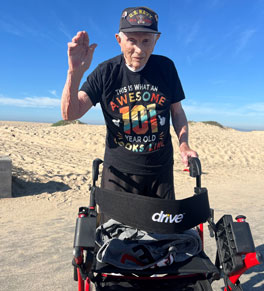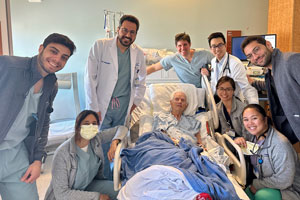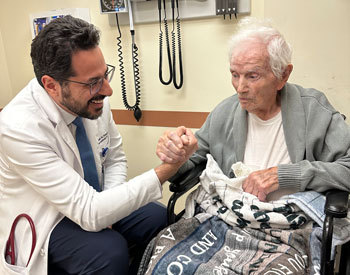Veteran wins another battle: aortic valve stenosis

At 101, Joe Bush has been there and done that — literally.
The U.S. Navy veteran served in World War II and the Korean War. He fought in the battles of the Lingayen Gulf, Iwo Jima and Okinawa. Once, he shot down an enemy kamikaze pilot.
Back at home in Westminster, Calif., Bush has been waging another battle: severe aortic valve stenosis. The condition, which occurs when the aortic heart valve becomes too stiff or narrowed, landed him in the UCI Health cardiac intensive care unit with heart failure and a lung infection in March.
Interventional cardiologist Dr. Antonio H. Frangieh was concerned about Bush’s ability to survive in his extremely critical condition.
“When someone starts to have symptoms due to severe aortic valve stenosis, then the chances of death due to the valve issue can be as high as 50% over the next two years and as high as 80% over the next five years,” says Frangieh, who specializes in interventional cardiology, valves and structural heart disease.
“Our goal was to increase survivability and, more importantly, to improve his quality of life.”
TAVR: expanding access to heart treatment
To accomplish that, Frangieh thought Bush would benefit from a transcatheter aortic valve replacement (TAVR) to restore blood flow to his heart once his lung infection started to improve. The procedure uses a catheter to guide a new valve into the heart through an incision in the leg with minimal sedation.
TAVR is a minimally invasive alternative to open-heart surgery, which was not an option for Bush due to his advanced age, frailty and critical condition.
Although TAVR does carry some risk, Frangieh and members of the UCI Health multidisciplinary heart team felt the procedure could save Bush’s life.
Additionally, the TAVR procedure has evolved through the years.
“TAVR has come a long way since its beginning a couple of decades ago,” says Frangieh.
“When well-planned and prepared, it is now safer, more streamlined and standardized. It is the therapy we recommend for most patients over 65.”
Expertise in complex conditions
UCI Health, the only academic health system based in Orange County, is equipped with the expertise necessary to treat some of the most complex heart conditions and seriously ill patients.
The Cardiology Services team of interventional cardiologists, cardiothoracic surgeons, imaging cardiologists, cardiac anesthesiologists and others collaborate to identify the best treatment approaches for each patient.
“We recommend the treatment modality, valve choice and timing of intervention, then implement best practices to safely perform the procedure and ensure the best outcome for the patient.”
Bush and his family were also closely involved with all treatment decisions, Frangieh says.
The next milestone: 102
The results couldn’t have been better for Bush. He's recovering from his procedure and is hopeful that he’ll soon be back to daily walks on his favorite beach, catching up with friends as he has done for years.
“I feel much better and it’s much easier to breathe now,” he says.
With a new lease on life, his sights are set on marking a milestone that seemed impossible just a few months ago when he landed in the cardiac ICU.
“I'm looking forward to my big 102nd birthday party on May 11,” he says. “And a ride in a World War II-era jeep in the Huntington Beach Fourth of July parade!"
Explore further
Browse more blog posts by topic.





 Joe Bush with his UCI Health Cardiology Services care team. Credit: Joe Bush and family.
Joe Bush with his UCI Health Cardiology Services care team. Credit: Joe Bush and family. Joe Bush with his interventional cardiologist, Dr. Antonio Frangieh. Credit: Joe Bush and family.
Joe Bush with his interventional cardiologist, Dr. Antonio Frangieh. Credit: Joe Bush and family.